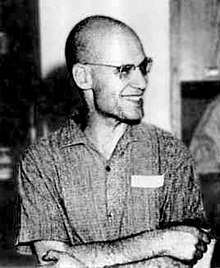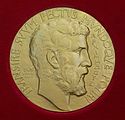Alexander Grothendieck
Alexander Grothendieck (ur. 28 marca 1928 w Berlinie, zm. 13 listopada 2014 w Saint-Girons)[1][2] – jeden z najwybitniejszych matematyków XX wieku. Początkowo zajmował się analizą funkcjonalną, zwłaszcza teorią przestrzeni Banacha oraz przestrzeniami liniowo-topologicznymi i ich iloczynami tensorowymi. Twórca nowoczesnych podstaw geometrii algebraicznej. W czasie wojny ukrywał się w Le Chambon-sur-Lignon. Laureat Medalu Fieldsa w 1966 roku[3].
Przypisy
- ↑ Philippe Douroux, Alexandre Grothendieck, ou la mort d’un génie qui voulait se faire oublier, Libération, 14 listopada 2014 [dostęp 2014-11-15] (fr.).
- ↑ Bruce Weber, Julie Rehmeyer, Alexander Grothendieck, Math Enigma, Dies at 86, The New York Times, 14 listopada 2014 [dostęp 2014-11-15] (ang.).
- ↑ Holger Dambeck, Einsames Genie: Mathematik-Mönch Grothendieck ist tot, Der Spiegel, 14 listopada 2014 [dostęp 2014-11-14] (niem.).
Linki zewnętrzne
- Polskojęzyczne
- Obcojęzyczne
 John J. O'Connor; Edmund F. Robertson: Alexander Grothendieck w MacTutor History of Mathematics archive (ang.)
John J. O'Connor; Edmund F. Robertson: Alexander Grothendieck w MacTutor History of Mathematics archive (ang.)- The Grothendieck Biography Project
- Strona poświęcona w całości A.G.
- Prace A.G.
- ISNI: 0000 0001 2120 9530
- VIAF: 12381506
- LCCN: n50031015
- GND: 118952773
- NDL: 00441839
- LIBRIS: 0xbddh7j19rr1wn
- BnF: 123417348
- SUDOC: 032375549
- NLA: 35154098
- NKC: xx0044949
- BNE: XX1266968
- NTA: 075208466
- BIBSYS: 90303076, 90342836
- CiNii: DA01678656
- Open Library: OL1518040A
- PLWABN: 9810670022305606
- NUKAT: n99051729
- J9U: 987007567929505171
- CANTIC: a11568173
- NSK: 000160427
- CONOR: 115910243
- WorldCat: lccn-n50031015
Media użyte na tej stronie
The photo carries no copyright and may be freely used for publications. IMU requests, though, that Stefan Zachow's authorship is duly acknowledged. This is the medal that was declined in 2006 by en:Grigori Perelman for his work on the en:Poincaré conjecture. Source: The International Mathematical Union (with more detailed information about copyright at an image description page there)
Autor: Konrad Jacobs, Erlangen, Copyright by MFO / Original uploader was AEDP at it.wikipedia, Licencja: CC BY-SA 2.0 de
Alexander Grothendieck



